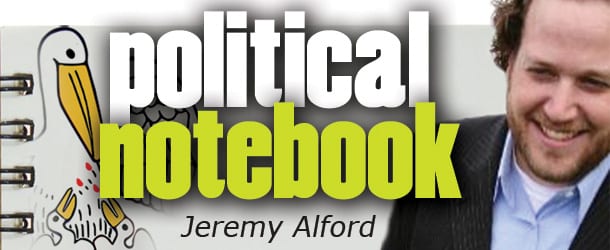By Jeremy Alford and Mitch Rabalais
“Love him or hate him, most every (Louisiana) voter has an opinion about President Donald Trump.” That was the analysis offered up by Bernie Pinsonat of Southern Media and Opinion Research, a Baton Rouge-based polling firm that conducted a statewide survey of 500 likely Louisiana voters from Nov. 28-30.
In that poll, Trump received the highest “excellent” job rating of any elected official surveyed. He also scored the highest “poor” rating.
When all the numbers were combined, Trump’s positive job rating in Louisiana was 48 percent. Pinsonat said that rating is “down slightly” due to lower rankings by black voters.
“Trump’s positive job ratings are almost exclusively from white voters, with only 7 percent of black voters giving him a positive rating, which is down from 16 percent in May,” Pinsonat said. “Eighty-eight percent of Republican voters rate his job performance as positive. Eighty-nine percent of black voters rate Trump’s job performance as negative.”
In the latest national Gallup poll, conducted Dec. 28-30, the president had an approval rating of 40 percent nationally and a disapproval rating of 55 percent.
That’s a far cry from the 58 percent Trump received from Louisiana voters when he appeared on the ballot as a presidential candidate on Nov. 8, 2016.
The political question is how much further Trump can fall in Louisiana.
Already some of the Bayou State’s delegation members, like U.S. Sen. John Kennedy and Congressman Garret Graves, R-Baton Rouge, are stepping outside of the party line to oppose a few of the president’s nominees.
The national narrative has been pushing some white Democrats away from the GOP, even in Louisiana. But the tax plan that was passed before the holidays gives Republicans a reason to spend money in the 2018 cycle to remind those voters why they liked elephants over donkeys in the first place, according to Pinsonat.
New Treasurer Focused On ‘Checkbook’ Concept
When Treasurer John Schroder was running for the office he was sworn into last month, he promised voters a website where government spending could be tracked and investigated.
As Schroder was campaigning on the idea, other lawmakers and special interest groups were also looking into similar models to implement in Louisiana, with most gravitating back toward something called the Ohio Checkbook.
Now there are conservative outfits, like the Louisiana Association of Business and Industry and the state chapter of Americans For Prosperity, vowing to make the spending transparency website a reality.
Schroder, for his part, said in a recent interview that he remains focused on achieving his original goal as well. “I’ll partner up with anybody, but I don’t want to be stonewalled,” the treasurer said. “We are working our way toward that already in this department.”
If the drive to establish a statewide system fails, Schroder said he would still want to establish online access into his own department. “I’ll do it,” he said. “I don’t need legislation to do that.”
The Ohio Checkbook was created by Ohio Treasurer Josh Mandel, among others. It allows anyone to use Google-style queries to track or search for spending by the state, local governments, school districts, pension systems and other entities.
Louisiana has a similar system in place now called LaTrac. But Schroder and others contend it falls short and doesn’t dig deep enough.
“Money and funding is obviously a challenge. But a transparent portal into spending could generate savings for us. People’s activities change when you make things more transparent.”
The Ohio Checkbook reportedly cost $800,000 and took two years to bring online.
They Said It
“He had a rougher year than most of us … It’s a hell of a way to lose weight.”
— President Donald Trump, on House Majority Whip Steve Scalise, a gunshot victim, to an NBC News reporter
“I don’t think the body has the stomach to make the hard decisions.”
— State Rep. Kenny Havard, R-St. Francisville, describing the House of Representatives, to The Advocate
“I’m playing the nice guy.”
— John Fortunato, a candidate for Jefferson Parish sheriff describing his campaign strategy, to WWL-TV.
New Look For Regents Board
The Louisiana Board of Regents, which oversees public higher education, has a whole new look. Former district attorney Robert W. Levy was selected as the new chairman of the influential board, replacing Richard Lipsey, whose term has expired.
It won’t be too much of an adjustment for Levy, who has served on the board for more than 16 years, including one term as chair.
“I am keenly aware of both the challenges and the opportunities that are ahead,” he said. “These are critical times in higher education that call for tough decisions — especially when we are continuously faced with budgetary challenges and limited funding.”
To increase educational attainment, Levy said the state should “stop disinvesting in higher education” and get back to investing in students and institutions.
“To do less is to continue our rankings at the bottom of the list for every good higher education measure and the top of the list for negative measures,” he said. “We must strive to increase our access and success.”
A new board member, former state Senate President Randy Ewing, was also sworn in.
Political History: The Mother Of All Negative Ads
Before John Bel Edwards’ “Prostitutes Over Patriots” ad shook the 2015 gubernatorial campaign, another TV spot set the bar for negativity in Louisiana’s political history.
In 1990, then-U.S. Sen. J. Bennett Johnston was in the race of his political life, trying to fight off a scrappy challenge from then-state Rep. David Duke, the famed white supremacist.
Dismissing his past KKK activities as “youthful indiscretions,” Duke pushed hard on his anti-tax, anti-trade and anti-affirmative action message. With an economic downturn, frustrated voters were far more receptive than expected.
Shedding the label of a “fringe candidate,” Duke became a serious threat. He packed arenas with frenzied crowds as he barnstormed across the state, while his signs began popping up like mushrooms along Louisiana highways.
Formidable as chairman of the Senate Energy Committee and influential as a leader in the Democratic Caucus, Johnston had been expected to win the re-election easily. His early TV spots focused on the economic impact of federal spending that the senator had brought home. Out on the stump, he refused even to mention Duke by name.
As summer turned to fall, however, the senator decided to go negative, incredulous at Duke’s momentum. Johnston went on a statewide bus tour, at each stop viciously attacking the challenger and reminding crowds of Duke’s Nazi and KKK connections.
Using old tapes they had obtained, the Johnston campaign crafted the ad they believed would sink Duke. By September, it hit the airwaves.
The 30-second spot opened with a close up on a burning cross, its flames audibly crackling. Overlaid was an eerie musical score. A narrator intoned, “David Duke led the Ku Klux Klan … as an adult.”
Duke, in a suit, is then clearly shown speaking to a group of hooded Klansmen, leading them in Nazi salutes and chants of “White Victory.”
The spot shocked audiences. It received unprecedented free airtime, playing in its entirety on both local and network news. Within a week, Duke’s poll numbers took a six-point dip.
Johnston, for his part, triumphed on Election Day with 54 percent of the vote.
As for Duke, he wasn’t quite done, and announced his candidacy for governor just a few weeks later.
Special Elections Coming
In the coming months, voters statewide will be reminded that they’ll be heading back to the polls this fall to re-elect members of the United State Congress.
In some corners of Louisiana, however, there will be special elections for the Louisiana Legislature in the spring as well. That includes House District 86 in Tangipahoa Parish, which is vacant due to the sudden resignation of former Rep. Chris Broadwater.
Hammond attorney Nicky Muscarello has already announced for the seat, but several others are looking at it, including, LaPolitics has learned, Democrat Brad Stevens, the nephew and former law partner of Gov. John Bel Edwards.
When asked recently who might win the race, the governor told The Advocate, without hinting at who might run, “It will be somebody that I know pretty well, probably.”
Other names to keep an eye on include Jimmy Gregory, an Independence Alderman and restauranteur, and David Vial, a parish councilman.
Janice Holland, who ran against Rep. Robby Carter, D-Greensburg, last cycle, and Rev. Ivory Dyson are being encouraged to run as well.
There will likewise be a spring special election in House District 93, which encompasses New Orleans’ French Quarter area, and is being vacated by Rep. Helena Moreno, who was elected last fall to the New Orleans City Council.
The list for this special election is becoming rather large. For now, the three names bubbling to the surface the most often are City Planning Commission chair Royce Duplessis, attorney Kenny Bordes and former WDSU-TV anchor Camille Whitworth, who, like Moreno, has a journalism background.
For more Louisiana political news, visit www.LaPolitics.com or follow Jeremy Alford on Twitter @LaPoliticsNow.














Comments are closed.